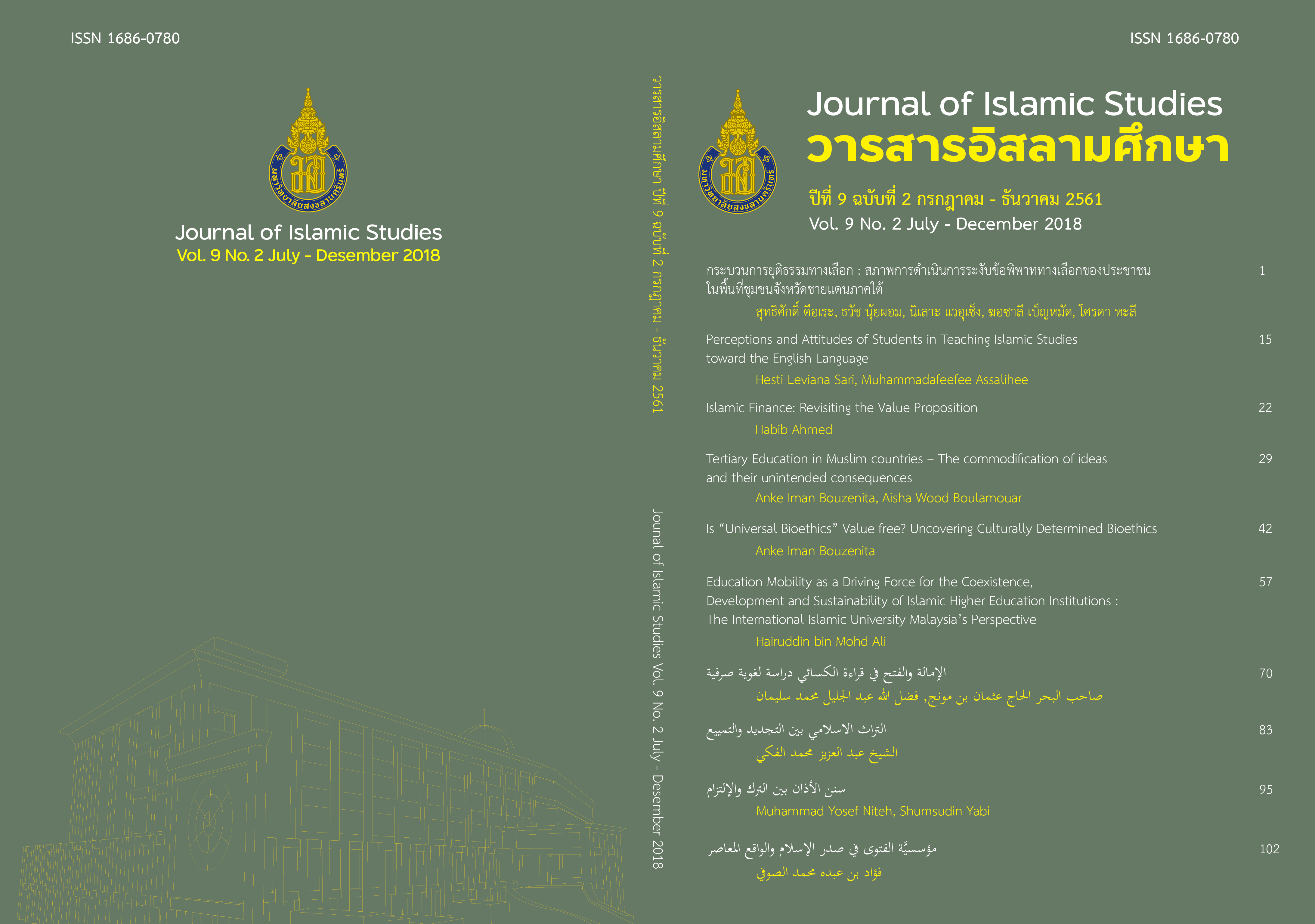Conditions and Problems on Implementing Japanese Lesson Study in Islamic Private Schools in Southern Thailand
Keywords:
Conditions and Problems, Lesson Study, Islamic Private School, Three Southern Border Provinces of ThailandAbstract
Lesson Study (LS) has been rapidly spread in many countries. It is a form of long-term professional development that teachers collaboratively plan, do research, and study on how to teach lessons to enhance students’ learning capability. This study aimed 1) to find out the perception of principals and teachers in the Islamic private schools towards LS, 2) to find out conditions and problems on the implementation of LS of the teachers in the schools. The samples were three school principals and seven teachers affiliated with Assalam Smart School Association. The qualitative data collection and the analysis employed were the in-depth interviews, and content analysis, respectively.
The study found that the principals and teachers perceived LS as a new significant approach to support teacher professional development. It was also discovered that the Islamic private schools began to practice it two years ago in the mathematics classrooms. The implemented lesson study consisted of seven processes as follows: 1) setting learning goals and designing problematic situations; 2) Islamizing situational knowledge; 3) creating teaching and learning materials, media and lessons based on the different approaches of thinking; 4) implementing the lesson plans; 5) classroom observation; 6) reflecting the results of teaching; and 7) exchanging knowledge among the teachers. It was explored the four major problems of its implementation namely 1) the ability to coach teachers, 2) lack of the principal involvement and support, 3) time management of LS team, as well as 4) lack of supporting facilities and resources.
References
Baba, T. (2007). Japanese Education and Lesson Study: An Overview Section 1.1:“How is Lesson Study Implemented?”. In M. Isoda, M. Stephens, Y. Ohara, & T. Miyakawa (Eds.), Japanese lesson study in mathematics: Its impact, diversity and potential for educational improvement (p.1). Singapore: World Scientific Publishing Co. Pte. Ltd.
Chantavanich, S. (2011). Qualitative Research Analysis (10 th ed). Bangkok: Chulalongkorn University Press.
Dudley, P. (2014). Lesson Study: a handbook. Retrieved from http://lessonstudy.co.uk/wp-content/uploads/2012/03/new-handbook-revisedMay14.pdf
Inprasitha, M., Isoda, M., Wang-Iverson, P., & Yeap, B.-H. (2015). Lesson study: Challenges in mathematics education. Singapore: World Scientific.
Inprasitha, N. (2009). Lesson Study: an Innovation for Teacher Transformation Journal of Education, Khon Kaen University, 32(2), 12-21.
Jaijan, W., & Suttiamporn, W. (2013). Mathematical connections of students in lesson study and open approach. RMUTSB ACADEMIC JOURNAL, 1(1), 69-82.
Lewis, C. C. (2002). Lesson Study: A Handbook of Teacher-led Instructional Change. Virginia: Research for Better Schools.
Nashruddin, W., & Nurrachman, D. (2016). The Implementation of Lesson Study in English Language Learning: A Case Study. Dinamika Ilmu, 16(2), 169-179.
National Institution of Educational Testing Service. (2553). Thai educational crisis from the result of O-NET, I-NET, V-NET, U-NET, N-NET GAT และ PAT. Bangkok: National Institution of Educational Testing Service.
Ngamkanok, S. (2013). Educational Administration for Promote Lesson Study. Journal of Education, 24(3), 37-47.
Palys, T. (2008). Purposive Sampling. In L. M. Given (Ed.), The Sage encyclopedia of qualitative research methods. California: Sage Publications.California: Sage Publications
Schensul, J. J. (2008). Methods. In L. M. Given (Ed.), The Sage encyclopedia of qualitative research methods (pp. 521-526): Sage Publications. California: Sage Publications
Stigler, J. W., & Hiebert, J. (2007). The Teaching Gap: Best Ideas from the World's Teachers for Improving Education in the Classroom. NY: Free Press.
Suhaili, A. S., & Khalid, M. (2011). Mathematics teachers’ perception of lesson study as a continuous professional development programme. Journal of Science and Mathematics in Southeast Asia, 34(1), 67-89.
Woranetsudathip, N. (2011). Lesson Study: A New Concept for Teacher Professional Development. KKU Research Journal, 1(2), 86-99.
Downloads
Published
How to Cite
Issue
Section
License
Copyright (c) 2018 Journal of Islamic Studies, Prince of Songkla University, Pattani Campus

This work is licensed under a Creative Commons Attribution 4.0 International License.
All articles Published in The Journal of Islamic Studies are author’s opinions, and not the responsibility of the Faculty of Islamic Sciences nor the editorial board. However any citation should be referred to the journal.
















